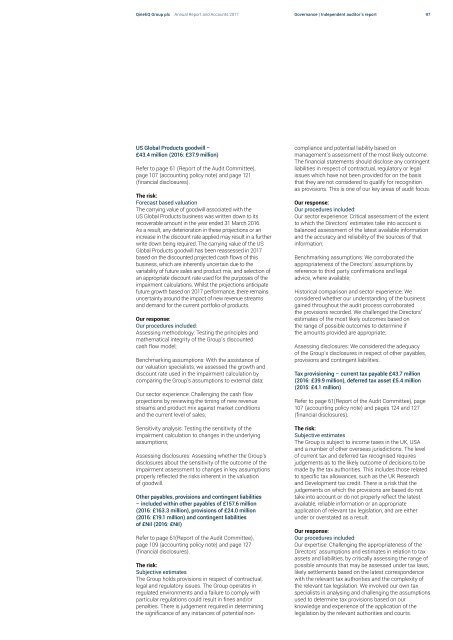QinetiQ Annual Report 2017
Create successful ePaper yourself
Turn your PDF publications into a flip-book with our unique Google optimized e-Paper software.
<strong>QinetiQ</strong> Group plc <strong>Annual</strong> <strong>Report</strong> and Accounts <strong>2017</strong><br />
Governance | Independent auditor’s report<br />
97<br />
US Global Products goodwill –<br />
£43.4 million (2016: £37.9 million)<br />
Refer to page 61 (<strong>Report</strong> of the Audit Committee),<br />
page 107 (accounting policy note) and page 121<br />
(financial disclosures).<br />
The risk:<br />
Forecast based valuation<br />
The carrying value of goodwill associated with the<br />
US Global Products business was written down to its<br />
recoverable amount in the year ended 31 March 2016.<br />
As a result, any deterioration in these projections or an<br />
increase in the discount rate applied may result in a further<br />
write down being required. The carrying value of the US<br />
Global Products goodwill has been reassessed in <strong>2017</strong><br />
based on the discounted projected cash flows of this<br />
business, which are inherently uncertain due to the<br />
variability of future sales and product mix, and selection of<br />
an appropriate discount rate used for the purposes of the<br />
impairment calculations. Whilst the projections anticipate<br />
future growth based on <strong>2017</strong> performance, there remains<br />
uncertainty around the impact of new revenue streams<br />
and demand for the current portfolio of products.<br />
Our response:<br />
Our procedures included:<br />
Assessing methodology: Testing the principles and<br />
mathematical integrity of the Group’s discounted<br />
cash flow model;<br />
Benchmarking assumptions: With the assistance of<br />
our valuation specialists, we assessed the growth and<br />
discount rate used in the impairment calculation by<br />
comparing the Group’s assumptions to external data;<br />
Our sector experience: Challenging the cash flow<br />
projections by reviewing the timing of new revenue<br />
streams and product mix against market conditions<br />
and the current level of sales;<br />
Sensitivity analysis: Testing the sensitivity of the<br />
impairment calculation to changes in the underlying<br />
assumptions;<br />
Assessing disclosures: Assessing whether the Group’s<br />
disclosures about the sensitivity of the outcome of the<br />
impairment assessment to changes in key assumptions<br />
properly reflected the risks inherent in the valuation<br />
of goodwill.<br />
Other payables, provisions and contingent liabilities<br />
– included within other payables of £157.6 million<br />
(2016: £163.3 million), provisions of £24.0 million<br />
(2016: £19.1 million) and contingent liabilities<br />
of £Nil (2016: £Nil)<br />
Refer to page 61(<strong>Report</strong> of the Audit Committee),<br />
page 109 (accounting policy note) and page 127<br />
(financial disclosures).<br />
The risk:<br />
Subjective estimates<br />
The Group holds provisions in respect of contractual,<br />
legal and regulatory issues. The Group operates in<br />
regulated environments and a failure to comply with<br />
particular regulations could result in fines and/or<br />
penalties. There is judgement required in determining<br />
the significance of any instances of potential noncompliance<br />
and potential liability based on<br />
management’s assessment of the most likely outcome.<br />
The financial statements should disclose any contingent<br />
liabilities in respect of contractual, regulatory or legal<br />
issues which have not been provided for on the basis<br />
that they are not considered to qualify for recognition<br />
as provisions. This is one of our key areas of audit focus.<br />
Our response:<br />
Our procedures included:<br />
Our sector experience: Critical assessment of the extent<br />
to which the Directors’ estimates take into account a<br />
balanced assessment of the latest available information<br />
and the accuracy and reliability of the sources of that<br />
information;<br />
Benchmarking assumptions: We corroborated the<br />
appropriateness of the Directors’ assumptions by<br />
reference to third party confirmations and legal<br />
advice, where available;<br />
Historical comparison and sector experience: We<br />
considered whether our understanding of the business<br />
gained throughout the audit process corroborated<br />
the provisions recorded. We challenged the Directors’<br />
estimates of the most likely outcomes based on<br />
the range of possible outcomes to determine if<br />
the amounts provided are appropriate;<br />
Assessing disclosures: We considered the adequacy<br />
of the Group’s disclosures in respect of other payables,<br />
provisions and contingent liabilities.<br />
Tax provisioning – current tax payable £43.7 million<br />
(2016: £39.9 million), deferred tax asset £5.4 million<br />
(2015: £4.1 million)<br />
Refer to page 61(<strong>Report</strong> of the Audit Committee), page<br />
107 (accounting policy note) and pages 124 and 127<br />
(financial disclosures).<br />
The risk:<br />
Subjective estimates<br />
The Group is subject to income taxes in the UK, USA<br />
and a number of other overseas jurisdictions. The level<br />
of current tax and deferred tax recognised requires<br />
judgements as to the likely outcome of decisions to be<br />
made by the tax authorities. This includes those related<br />
to specific tax allowances, such as the UK Research<br />
and Development tax credit. There is a risk that the<br />
judgements on which the provisions are based do not<br />
take into account or do not properly reflect the latest<br />
available, reliable information or an appropriate<br />
application of relevant tax legislation, and are either<br />
under or overstated as a result.<br />
Our response:<br />
Our procedures included:<br />
Our expertise: Challenging the appropriateness of the<br />
Directors’ assumptions and estimates in relation to tax<br />
assets and liabilities, by critically assessing the range of<br />
possible amounts that may be assessed under tax laws,<br />
likely settlements based on the latest correspondence<br />
with the relevant tax authorities and the complexity of<br />
the relevant tax legislation. We involved our own tax<br />
specialists in analysing and challenging the assumptions<br />
used to determine tax provisions based on our<br />
knowledge and experience of the application of the<br />
legislation by the relevant authorities and courts.
















